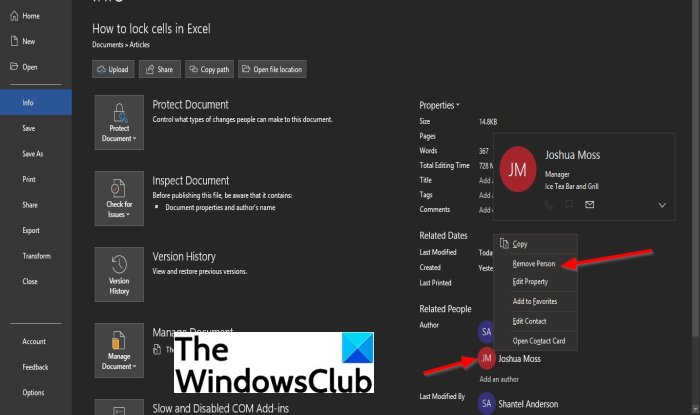

- #How to change author name in word options trial#
- #How to change author name in word options series#
If the corresponding author does not complete the submission at that time, the manuscript will remain in the “Submissions/Revisions in progress” queue in the Author Area. This enables saving that page or continuing to the next page. The corresponding author may begin a submission and continue the process later by clicking on “Save/Continue” at the bottom of the screen. It is critical that the corresponding author includes correct email addresses for all authors when submitting the manuscript doing so will prevent delays in notifications to authors at the appropriate times. Once a new account has been created, the author should enter the “Author Area” and follow directions to submit a manuscript. If it is the corresponding author’s first time using the submission system, there will be a prompt to create a new account.
Structured abstract with Press online tracking system. #How to change author name in word options series#
This category is limited to case series and case reports that open up new lines of inquiry.
Accepted papers will require a short form to appear in print. Studies that evaluate therapeutic interventions, biomarkers, diagnostic accuracy studies, and studies on disease prognosis require a Classification of Evidence statement. Reports of clinical trials have additional requirements. Must include information on research ethics and informed consent. Requires use of relevant reporting guidelines and extensions, if applicable. ≤4,500 Words (excluding abstract, tables, figure legends, appendices, and references). If the question is important, the methods are sound, and the reporting transparent, equal consideration is given to all papers, regardless of the results (positive or null). Research papers that focus on the education of students, residents, fellows, and neurologists also fall within this category. Most research papers submitted to the Neurology journals fall into this category, including (but not limited to) clinical trials observational studies systematic reviews and meta-analyses studies of diagnostic or screening tests genetic risk prediction studies economic evaluation studies studies developing, validating, or updating a prediction model and health outcomes research studies. 5.9 Publication Policies Not Addressed ElsewhereĪrticle types for: Neurology: Clinical Practice, Neurology: Genetics, Neurology: Neuroimmunology & Neuroinflammation, and Neurology: Education Neurology 1.1 Research Articles. 5.5.2 Data Availability Policy and Statement. 5.4.3 Consent to Disclose for Publication of Case reports and Case Series. 5.4.2 Informed Consent for Participation in Research Studies. 5.4 Research Ethics and Informed Consent. 5.3 Scientific Misconduct and Breaches of Publication Ethics. 5.2 Conflicts of Interest and Disclosure. 5.1.5 Author Name Changes After Publication. 5.1.4 Changes in Authorship After Submission. 5.1.3.3 Study Groups in Which Some Members Qualify as Authors and Others Qualify as Coinvestigators. 5.1.3.2 Study Groups in Which All Members Qualify as Authors. 5.1.3.1 Authors Representing a Study Group. 

5.1.2 Reporting Authors, Coinvestigators, and Contributors.4.3 Forms Needed at Provisional Acceptance.4.1 Tracking the Status of a Manuscript.3.4 Submitting an Editorial or Invited Commentary.3.1 Forms and Materials Required at Time of Submission.2.3 Additional Requirements for Reports of Genetic Studies.2.2.3 Protocol and Statistical Analysis Plan.
#How to change author name in word options trial#
2.2 Additional Requirements for Clinical Trial Reports. 2.1.5.2.2 Research Methods in Neurology. 2.1.4.3 Unstructured Abstract for Other Article Types. 2.1.4.2 Structured Abstract for Clinical Scientific Notes. 2.1.4.1 Structured Abstract for Research Articles. Neurology: Neuroimmunology & Neuroinflammation.







 0 kommentar(er)
0 kommentar(er)
